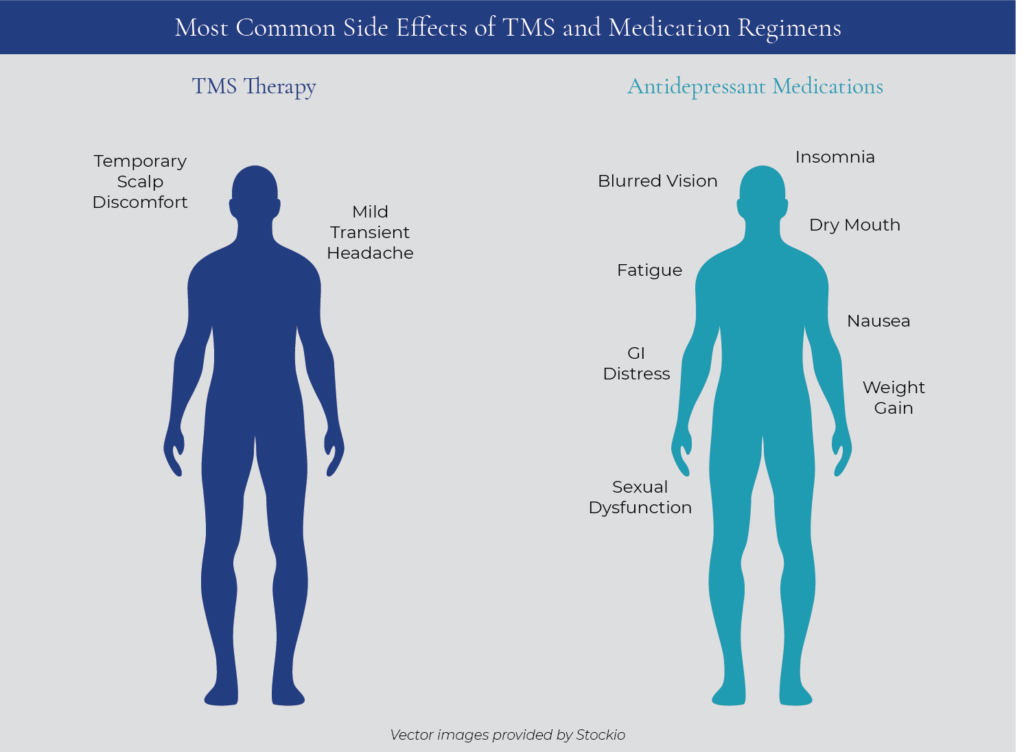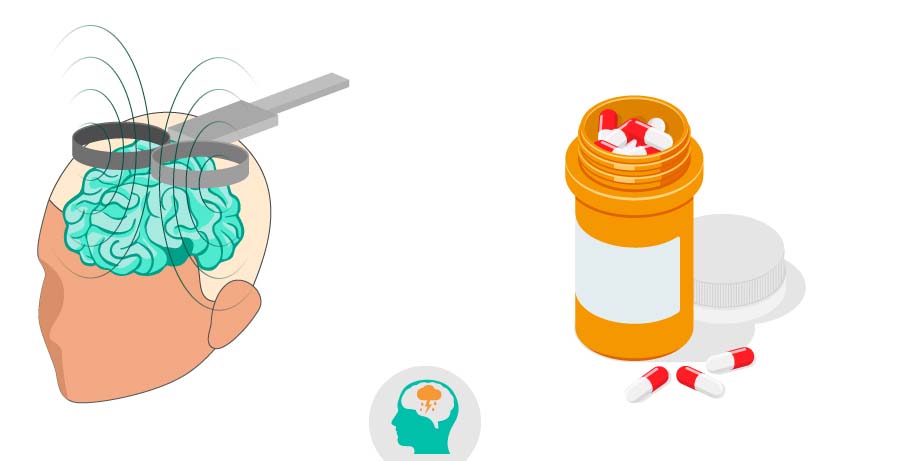TMS vs Antidepressants
Exploring various treatment alternatives for depression is sometimes essential in finding the proper treatment for you. Antidepressants and TMS therapy are two treatments you will likely encounter in your search, but which one should you try first? Are they effective? How long do both treatments last?
Next, we will try answering these questions and more to help you determine which treatment option may be best for you.
TMS therapy and antidepressants are effective treatments for depression. However, one of the benefits of TMS therapy is that it can provide relief for people who have not had much success with antidepressants or who cannot tolerate them.
Examining all the details from both is necessary to compare TMS therapy and antidepressants effectively. Knowing their function, side effects, and success rates can help influence your treatment options.
HOW TMS THERAPY FUNCTIONS
TMS Therapy utilizes magnetic pulses to stimulate specific brain zones responsible for regulating mood and emotions. Stimulation of nerves in these regions of the brain can improve the brain’s ability to regulate mood.
HOW ANTIDEPRESSANTS FUNCTION
Chemical messengers called neurotransmitters allow the brain to receive signals from the nervous system. Antidepressants generally increase the levels of specific neurotransmitters that affect mood and emotions. Different types of antidepressants achieve this result by interacting with certain neurotransmitters.
TMS THERAPY SUCCESS RATES
Data show that about two-thirds of individuals who have not benefited from antidepressants see good results with TMS therapy. Some even go into complete remission and do not experience depressive episodes or symptoms again.
Others may need maintenance sessions later on if their symptoms recur. TMS therapy continues highly successful after initial sessions, so follow-up sessions are often beneficial.

ANTIDEPRESSANTS SUCCESS RATES
Antidepressants relieve symptoms in about two out of three patients who take them to treat depression. Yet, they frequently require some trial and error. Occasionally individuals must try two or three antidepressants before they find an adequate one. And around one-third or one-quarter of patients do not experience relief from antidepressants. TMS vs Antidepressants
TMS THERAPY SIDE EFFECTS
A powerful benefit of TMS therapy is that it involves minimal side effects. Around forty-two percent of individuals experience mild to moderate headaches or discomfort during or after the treatment session. Still, these side effects diminish for most individuals and eventually cease as they acclimate to the treatment. TMS vs Antidepressants
A rare side effect of TMS therapy is seizures, which occur in less than one in sixty thousand TMS sessions. TMS vs Antidepressants
ANTIDEPRESSANT SIDE EFFECTS
Approximately more than half of patients taking antidepressants experience side effects. The particular side effects these patients experience depend on the type of antidepressant they take. Common side effects of SSRI and SNRI antidepressants are headaches, nausea, diarrhea, sleep problems, and sexual issues.
Tricyclic antidepressants are more prone to side effects such as blurred vision, tremors, dizziness, dry mouth, difficulty urinating, and constipation. In addition, rare side effects of taking antidepressants include heart problems and liver damage.
Mostly, side effects are less common after the first few weeks of antidepressant use. However, for some patients, the side effects are intolerable, which may lead them to discontinue treatment.
CONSIDERING BOTH ALTERNATIVES
When deciding on a specific treatment, it is imperative to consult with a licensed medical or mental health professional to examine the different possibilities that are available to you.
Concerning the above option, and according to studies, we can conclude that both antidepressants and TMS Therapy offer safe and effective relief of depressive symptoms. Mental health care providers consider SSRI and SNRI medications a first-line treatment for this condition, and they frequently consider them also an initial treatment option, as is psychotherapy.
As a non-invasive treatment, TMS therapy may generate significant and beneficial changes in a person’s well-being that can be introduced as a stand-alone treatment or combined with other forms of therapy, including medication.
Patients who struggle with severe depression, face treatment-resistant depression, or find the side effects of other treatments too adverse to continue may benefit significantly from this non-invasive alternative.
Evaluating your mental health treatment alternatives should be done in consultation with a trained specialized health care professional who can advise you toward the optimal treatment for your specific circumstances. Consultations are available through options such as your health care provider and local mental health treatment centers.

The truth is that everybody who experiences depression has their own story to tell, their way of negatively affecting their lives. However, some aspects of depression remain relatively constant, and this is the chaos it causes to sufferers and their loved ones.
Maintaining hope that mental health providers can treat depression is essential, remember.
Society is taking mental health awareness much more seriously. With today’s technological advances in mental health, we have many more tools to reach out and offer to individuals with this debilitating condition.
We can launch stronger and longer-lasting lifelines to bring individuals out of the darkness and make them feel like themselves again. Contact us today to learn more about TMS Therapy and see if it is right for you.
Finding the correct provider may be straightforward instead of overwhelming in answering questions. The provider should specialize in TMS therapy and have an experienced and trained treatment staff to support you. In addition, they should be able to customize your care to uphold your particular circumstances and coordinate with your referring physician.
Most importantly, you should feel confident about putting your health in their hands after your first consultation. If they do not check all the boxes for you, there is nothing wrong with looking elsewhere. You are the most important and should feel empowered to choose the best TMS provider for your care.
